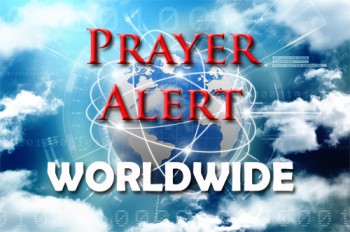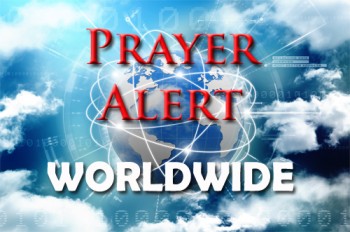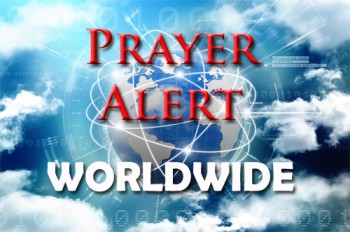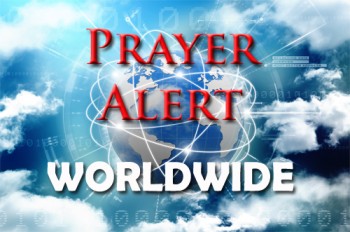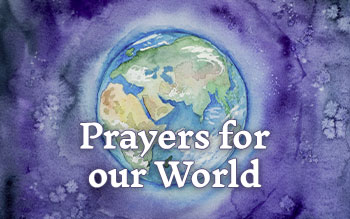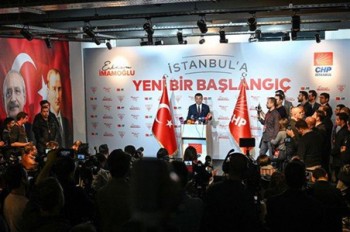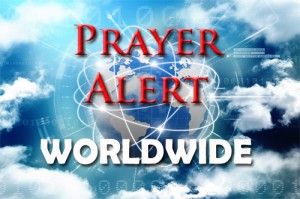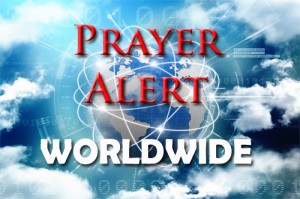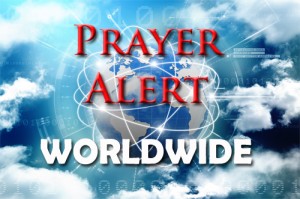Displaying items by tag: Erdogan
Turkey: bogus reforms ‘charm offensive’
Last week we prayed for change and the need for reforms to alter the way Turkey polices, prosecutes, judges, and imprisons its residents. Almost all Kurdish mayors have been replaced by government-appointed administrators. Judges whose verdicts disagree with government diktats are probed and often punished. 63,014 people were prosecuted for insulting President Erdoğan between 2014 and 2019; 9,554 of them were sentenced. A political analyst said Erdoğan's reform program survived only nine days, and his charm offensive is fake and is too little too late. He wants Turkey to continue as a third-world democracy while hoping to lure foreign investment on the same terms as a Western democracy, but investors are leaving. The economy is in freefall, with double-digit inflation and central bank interest rates up to 15%, while unemployment rises sharply. Erdogan promises to democratise, hoping to reverse the economic downfall, but that will not happen without real reforms.
Turkey: Kurdish region injustice continues
The police forces in Turkey’s Kurdish region resemble occupying armies. Government-appointed mayors, police brutality and armies of imams have altered society’s fabric. Allegations against Special Forces of rape and sexual harassment are ignored. If such accusations are publicised, officials will dismiss it as affairs between soldiers and girls who want to marry them. A former mayor commented, ‘It is better that they are involved in prostitution than protesting the government.’ A young Kurd who photographed a policeman killing an innocent Kurd in 2017 now faces twenty years in prison, while the policeman goes unpunished. Also recently hundreds of army officers, pilots and civilians were jailed for life for taking part in the 2016 attempted coup to overthrow President Erdoğan. The acquittal of the police officer and the hundreds jailed comes when Erdogan is trying to attract foreign investors. Even the simplest reforms would demand drastically altering the way Turkey polices, prosecutes, judges, and imprisons its residents. See
Turkey: scores of citizens with alleged outlaw links
Turkish prosecutors have issued arrest warrants for over 200 people accused of links to an outlawed group the government blames for the 2016 failed coup. Security forces are searching for 191 people, 181 of whom were active members of the air forces. Prosecutors also named suspects found on the messaging app ByLock which was used by followers of cleric Fethullah Gulen. Erdogan blames Gulen for the 2016 coup attempt that left 250+ dead and 2,000+ injured. Gulen, who lives in self-imposed American exile, denies involvement in attempting to unseat Erdogan. The latest arrests are part of a renewed push to suppress the group as parliament resumes debating a controversial bill boosting the powers of a neighbourhood watch force - Erdogan’s latest effort to tighten his grip on the country. The legislation would allow 28,000 watchmen to frisk citizens, demand identification, search their cars, and use weapons if needed.
Turkey: nuclear weapons
In an unprecedented move, President Erdogan has declared his desire to obtain nuclear weapons, flouting Turkey’s obligations as a signatory of the Non-Proliferation Treaty. In a speech he praised the advancement of Turkey’s defence industry, and then said, ‘It is all fine and well, yet some countries have missiles with nuclear warheads, not one or two. But I don’t have missiles with nuclear heads. This I cannot accept.’ This statement reflects his mistrust in the nuclear umbrella of NATO, to which his country belongs. It also suggests that he does not regard the American B61 tactical nuclear weapons deployed at an air base in southern Turkey, as part of NATO’s nuclear programme, as a significant deterrent. Erdogan’s crucial remark, ‘We are currently working on it’, suggests Turkey is engaged in activities to acquire a nuclear capability.
Muslims in Turkey showing interest in Jesus amid Erdogan's authoritarian crackdown, Andrew Brunson says
WASHINGTON — Evangelical missionary Andrew Brunson said Thursday that the authoritarian crackdown and struggling economy in Turkey are causing more Muslim Turks to show interest in the Bible at a time in which the “storm clouds” of Christian persecution seem to be forming.
Brunson, a North Carolina native who spent two decades planting churches in Turkey before spending two years in prison on trumped-up terrorism charges, expressed deep concern about the future of Turkey’s small Protestant population during a hearing hosted by the U.S. Commission on International Religious Freedom on Capitol Hill.
“There is still a high degree of freedom for Christians relative to other Muslim countries in the region, but I am concerned that all the signs point to this changing soon,” said Brunson, who was released from prison last October after months of pressure from the U.S. government.
In the midst of a massive government crackdown in the wake of the 2016 failed coup attempt against the Erdogan government, Brunson explained that the regime has accelerated the expulsion and deportation of foreign Christian leaders.
According to Brunson, as many as 50 foreign Christian families have recently been deported from Turkey.
The 51-year-old read off a list of Protestant Christians in Turkey who have been deported after being accused of being a “threat to national security.” Most of them were leaders within their respective churches, he said.
He added that the Turkish church relies on foreign leadership because the Turkish government does not allow Christians to set up training programs in order to develop leaders in the country.
In the city in which he served for many years, Izmir, Bruson said that nearly half of all churches there have lost their senior leaders.
Citing a 2018 report from the Turkish Association of Protestant Churches, Brunson said there has also been “a significant increase in public hate speech designed to incite public hatred of Protestants.”
He said even more concerning was the “coupling together of churches and terror organizations in news reports without any evidence of substantiation.”
He blamed the Erdogan government for sewing a deep hatred of Christians in the hearts of Muslim Turks by spreading lies about him and Christians. He said government-fed propaganda has created a tense atmosphere for Christians in Turkey.
Even after his release, Brunson said that lies are still being spread about him in Turkey. He was accused of being a spy and even working on behalf of the CIA in an effort to overthrow the Turkish government.
“The foreign minister still refers to me in public as a spy and calls me ‘Agent Brunson,’” he said. “After the State Department report on religious freedom was published recently, the spokesman insisted that ‘Pastor Brunson was convicted because of his affiliation with terrorism not because of his faith.’ This is simply not true. I know that the Turkish government, especially at the highest levels, knew all along that I was innocent.”
He added that there were accusations in Turkish media that he was the one who gave orders for the New Zealand mosque shootings in March that took the lives of 50 people. Brunson said he was disgusted with such an accusation.
“The government is using the after-coup, the conditions to crackdown on a lot of people. So far, it hasn’t included Christians that much,” Brunson said in response to a question from USCIRF Vice Chair Gayle Manchin. “Like I said, there is a high degree of freedom compared to other places in the Middle East. However, the signs are negative and the storm clouds are gathering.”
“I think there are a number of people in the Turkish church, who as they see a lot of the foreign Christians being expelled from the country, [who] are very concerned about what is going to happen to them,” he added.
Brunson said that his indictment provides an example of how the Erdogan government views Christians.
“My crime was ‘Christianization,’” he stressed. “Acting as, I quote, ‘as an agent of unconventional and psychological warfare under the guise of an evangelical church pastor.’ All of our work was intended to fragment Turkey, they said.”
“Basically, the indictment was associating Christianization with terrorism and presented Christianity as a danger to Turkey’s unit,” he continued. “The senior judge said I was not on trial for missionary activity. But much of the supposed evidence against me as proof of supporting terrorism was our ministry activities.”
Brunson added that Erdogan once said while speaking in the context of his case that “To be a Turk is to be a Muslim.”
“This is the way that they see things often,” he said. “Obviously, Christians are not a threat to the Turkish government in any way. We expect Christians to be good citizens, to pay their taxes, to obey the law. They tend to be very generous and loving people. But if someone has that mentality that to be a Turk is to be a Muslim, then if one leaves Islam and becomes a Christian, then they will be seen as traitors. This has been one of the problems.”
Despite the increasing social tensions and deportation of foreign pastors, Brunson said he has heard from leaders inside Turkey that curious Muslims in Turkey are coming to Christian churches in search of spiritual answers at a greater rate than before.
Brunson said that there are about 6,000 Protestant converts from Islam in the nation of 83 million people.
“But we do see many more people,” he said. “This is interesting to me as someone who was starting churches in Turkey. Because of the crackdown and the difficult conditions in Turkey right now, more and more people are showing an interest in the Bible and in visiting a church and asking questions about Christianity.”
Brunson told The Christian Post after the hearing that he believes there is a “great spiritual harvest” coming to Turkey in which many people will turn to Jesus.
“I think that the conditions for people to turn will be difficult conditions,” he said. “We have expected there to be a great move of God but we have expected that it will happen in difficult circumstances. So I think that this government is actually creating a lot of circumstances for many people. Since they are doing this in the name of Islam that many Muslims are saying, ‘Is this is what we want?”
Those “difficult conditions” come in the form of the struggling Turkish economy and the decline in the exchange value of the Turkish lira.
“Many young people, especially, are starting to question. One of the things I taught in Turkey and they used against me in the trial was I said that ‘Turkey will be shaken,’” Brunson explained to CP. “I also think the same thing could happen in the States. God will shake the foundations of the things that we trust in order to get our attention.”
I think that is what is happening now. There are a lot of people who before wouldn’t have spiritual questions,” he continued. “But because of the difficulties they are experiencing and the things they have taken for granted or trusted and given security have been kind of removed, now they are beginning to think about things they wouldn’t have before.”
Many of those who are coming to churches to “seek,” he said, are wanting either a copy of the New Testament or just want to meet a Christian and learn about Jesus.
“We see people dropping in at churches,” he said. “There are many more people coming and asking for information than in the past.”
Reporting by Samuel Smith for The Christian Post
PRAY that God would continue to use Andrew Brunson to share the needs for the prayers and partnerships for Turkey and what God is doing in the Middle East
PRAY that the current Turkey government would not suppress the freedom for all religions as stated in its constitution, especially that of Christians and the churches
PRAY that the nation-wide spiritual awakening would come in Turkey and among its people that they would open their hearts Jesus Christ and His gospel
Turkey: Erdogan’s Party Demands New Vote After Loss
By: Richard Pérez-Peña (New York Times, 4/9/2019)
Trying to reverse a stinging setback, Turkey’s ruling party on Tuesday demanded a redo of last week’s election for mayor of Istanbul, the country’s largest city and long a source of power and prestige for President Recep Tayyip Erdogan.
The extraordinary stance came as it became increasingly clear that a days-long recounting of ballots would not change the result that Binali Yildirim, the candidate of Mr. Erdogan’s Justice and Development Party, known as the A.K.P., had lost to the opposition candidate, EkremImamoglu, in the March 31 election.
Mr. Erdogan’s party had already demanded a recount of spoiled ballots in all of Istanbul and a full recount in some of the city’s districts. When that did not change the result, it called for a recount of the entire Istanbul vote, which the High Election Council refused.
The latest demand now puts the High Election Council squarely on the spot and threatens to precipitate a crisis for both Istanbul and the entire country, becoming the latest test of democratic institutions already groaning under the authoritarian strains of Mr. Erdogan’s 16 years in power.
“I find the chances extremely high that the election board will accept A.K.P.’s request to repeat the elections,’’ said SonerCagaptay, director of the Turkish Research Program at the Washington Institute for Near East Policy.
‘‘Far from being independent, the election board, like other institutions, has fallen under Erdogan’s power, and I would say the board has thus far taken steps to facilitate Erdogan’s each and every next move,’’ he added.
He noted that the council had already allowed a recount of invalid ballots, even though the A.K.P. presented no credible evidence, other than a narrow margin, that there had been irregularities.
That has not stopped the party or the president from alleging that the irregularities were systemic in Istanbul, where the candidates are separated by less than 0.3 percent of almost nine million votes cast.
“We will use the extraordinary appeal grounds and say we want to renew the elections in Istanbul,” Ali Ihsan Yavuz, the deputy head of the party, said at a televised news conference in Ankara, the capital. “Everywhere in Istanbul, organized acts were done. That is why we called it organized irregularity.”
Mr. Erdogan himself has cast doubt on the election and pressed the case for a do-over by citing examples of American elections where the margin was so narrow that the balloting was redone.
“Irregularities are not just a few, almost entirely it is irregular,” he said on Monday of the election in Istanbul, speaking at Ataturk Airport before leaving for a visit to Moscow.
Murat Yetkin, formerly the editor in chief of Hurriyet Daily News, wrote on his blog this week that even those in the president’s circle were divided about how far to push the challenge, with a small, determined group urging the president to “put his weight for renewing Istanbul elections.”
A second, larger group of more experienced politicians have argued to accept the results, because the challenge is actually benefiting Mr. Imamoglu by elevating his stature.
Judging by Mr. Erdogan’s statement this week, the hard-liners may be carrying the day, though it may also be a way for the president ‘‘to manage the trauma,’’ said OzgurUnluhisarcikli, the Ankara director of German Marshall Fund.
‘‘This looks like more to redefine the defeat in Istanbul as if it was actually won but stolen by illegitimate means,’’ said Mr. Unluhisarcikli, who noted that a new election would actually be quite risky for the president as the economy continues to deteriorate.
“I do not believe that Erdogan actually wants to renew the elections,’’ Mr. Unluhisarcikli said. ‘‘The economic realities do not allow this. It would be a huge gamble.’’
The result in Istanbul carries enormous weight, however, and there are clear incentives for the president and his party to fight a loss.
With 15 million people, most of them on the European side of the Bosporus, Istanbul is the most populous city on the Continent and Turkey’s economic capital. It is also Mr. Erdogan’s hometown and has long been a base of support for him.
Just as important, the opposition and some analysts say, the city has become a vital source of wealth in a network of cronyism and nepotism that has benefited from the awarding of municipal contracts and the distribution of city funds to charitable foundations with links to the president’s family.
Even before he has been officially declared the winner, Mr. Imamoglu, who ran for the opposition Republican People’s Party, has vowed to open the books of the city, which Mr. Erdogan and his party have controlled since 2002, to expose long-simmering accusations of corruption.
“The result of this election is clear,’’ Mr. Imamoglu said at a televised news conference on Tuesday, when he repeated his desire to take office and start working immediately. ‘‘The streets accepted the result. You can work hard and win five years later. We have won, admit it.”
Last week, Mr. Imamoglu said that with its continuing challenges to the result of the election, Mr. Erdogan’s party was stalling for time so that it could erase City Hall records from computers before independent auditors could carry out the review he promises.
Such allegations have taken on more weight with voters as the Turkish economy falters, undercutting the president’s long record of nearly unbroken economic growth. Turkey entered recession this year, and the currency, the lira, has continued to slide amid increasing worry by investors and markets.
The opposition party also won a close mayoral election in Ankara, a result that the election council has finalized. The potential loss of Istanbul would place both the country’s political and financial capitals in opposition hands.
Taken together with rest of the results from the March 31 elections, the balloting reflected increasing discontent among voters with Mr. Erdogan, who has concentrated executive powers, carried out a sweeping purge of opponents after a failed 2016 coup, and brought a once-vibrant news media to heel.
The High Election Council must consider the request by Mr. Erdogan’s party for a new election, but the opposition party insisted that the result was legitimate and clear.
“Both legally and conscientiously, there is no obstacle to giving EkremImamoglu his mayoral certificate,” FaikOztrak, the opposition spokesman, said in televised remarks. “Mr. Imamoglu is right now the elected mayor of Istanbul, as he was on the morning of April 1.”
He pointed out that Mr. Erdogan’s A.K.P. party had won many districts in Istanbul as well as other towns across the country, results that were not being challenged.
“So when A.K.P. mayors are elected it is the national will, but when the votes go to Imamoglu, it is dubious,’’ Mr. Oztrak said. ‘‘Even crows laugh at that. They should leave the nation alone.”
Pray for Turkey government
- We continue to pray that current Turkey government would heed to the final result of March 31 election in Istanbul as well, not calling for new vote.
- Pray that Turkish people would have the final and decisive voice regarding all political matters and ruling their own country as a democracy.
- Pray that all peoples in Turkey would find the True and Eternal Hope in Jesus Christ and His Kingdom rather than any earthly government.
More:http://silkwavemission.com/board.php?board=english&command=body&no=1037
Turkey: Erdogan and USA clash on Kurds
President Erdogan has snubbed US national security advisor John Bolton, who was visiting the region to discuss the withdrawal of US troops from Syria and future US involvement there. Bolton asked for assurances that Turkey would not harm Kurdish fighters in Syria in future. He held discussions with Turkish officials, but President Erdogan refused to meet him and described his comments as ‘a serious mistake’, adding: ‘We cannot make any concessions. Those involved in a Syrian terror corridor will receive the necessary punishment.’ A commentator said, ‘Everyone is jockeying for position in Syria because the war is winding down. There is concern over the US leaving Turkey in charge.’
Andrew Brunson freed
American pastor Andrew Brunson has been released after being detained in Turkey for two years. President Trump has already met Brunson, who had been charged with helping to plot a coup against President Erdogan and sentenced to 37 months in prison. The Turkish authorities chose to release him based on his time already served, as well as his manner during the proceedings. Prosecutors had been demanding a ten-year jail term. The case had soured relations between Turkey and the US, heightened by Trump's desire to support Brunson and emphasise the importance of religious freedom. Erdogan’s office denied that any deal with the US had taken place, and criticised Trump for tweeting that he had been ‘working very hard for Pastor Brunson’ and his release.
Turkey: Erdogan refuses to release pastor, lira plunges
The Turkish currency is in freefall after President Trump escalated a feud with Ankara by doubling tariffs on metals imports. The lira has long been falling due to worries about President Erdogan's influence over monetary policy and worsening US relations. Turkey and the USA are at odds over many issues, the most pressing being the detention of pastor Andrew Brunson who was jailed for allegedly supporting a group that Ankara blames for the failed coup. He faces 35 years in prison, and on 15 August a court ruled he must remain under house arrest. Qatar has pledged $15 billion of investments after Erdogan said that the shadowy ‘interest rate lobby’ and Western credit ratings agencies were attempting to bring down the economy. He said, ‘If there is anyone who has dollars or gold under their pillows, they should go and exchange it for liras at our banks. This is a national, domestic battle.’ See also
Turkey: critical election on 24 June
In March we prayed for Turkey to come to a turning point because President Erdogan's rise to power was returning Turkey to its Ottoman and Islamic heritage through authoritarianism, consolidation of power, increased support of radical Islam, reintroduction of Islamic cultural practices, and the dismissal of thousands of government workers, military, and journalists. Erdogan is a ruler trying to maintain the facade of democratic legitimacy by calling an election which he will probably win. It will bring in a new presidential system that drastically increases the powers of the president, while reducing the role of the parliament. Erdogan's Turkish nationalism stifles freedom of expression. Christian believers are treated as traitors to both Islam and the Turkish identity. Under the existing martial law, Erdogan has purged Turkey of political opponents and dissenters and has jailed many journalists. Pray for public sentiment to recognise the importance of religious and other freedoms. (Joshua 24:22)
